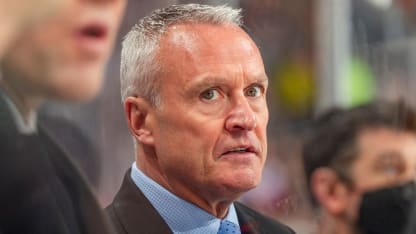The Coaches Room is a regular feature throughout the 2023-24 season by former NHL coaches and assistants who turn their critical gaze to the game and explain it through the lens of a teacher.
In this edition, Dean Evason, former coach of the Minnesota Wild and assistant with the Washington Capitals and Wild along with six seasons the head coach of the Milwaukee Admirals in the American Hockey League, writes about the importance of developing an earned culture within the team and the impact of that at this time of the season.
Developing an earned culture is essential to success in the NHL. Without it, you're probably just playing out the string at this time of the season, going nowhere. With it, you're either already in the Stanley Cup Playoffs or you're pushing, scratching and clawing to get there.
The process to developing it starts in July, at your prospect development camp.
The first thing that we've done in the past and that I want to continue to do as a head coach, is put up a sign just outside the dressing room that says, "This is earned, not given."
The meaning is, for you to walk through these doors and to sit in that stall you need to earn the right to be here, it's not just going to be given to you.
So, as soon as the development guys come into camp in the summer, we'd point that out right away, telling them you're being given an incredible opportunity to earn the right to sit in these seats. It's a temporary thing now but you want it to be permanent, so we start talking about that immediately.
Then you go to your rookie camp, and you speak to it again there.
Moving forward with your NHL group, when you get to that point, you have to stress to them verbally that it needs to be this way. You can talk until you are blue in the face, but you also have to back it up. The thing that coaches have now, and it is one of the only things that coaches have now, is ice time to give or to take away from the players.
It's so difficult to make trades in the NHL so you can't go in and threaten a guy that I'm going to trade you or we're going to send you down. The players aren't stupid. They know what's going on. They know the cap situation. They know it all.
But the thing you can stress the most as a coaching staff is to earn your ice time, earn your position, go out and take it.
I've said to a lot of guys over the years that if you don't like your role then you need to work hard to change it. You need to do something to earn the position of playing on the penalty kill, to be playing up in the lineup, or to get opportunities to play on the power play. You need to prove that, earn that. It's not just going to be given to you because you're a first-round pick or because you're a top free agent. You have to earn that right to be in those positions on our hockey club.
The earned culture changes every year because the dimensions of your group always change.
It would be fantastic to always have the same group, but that's not the case in today's game. It's not reality.
If you look back to when I played there wasn't a lot of trades. You stayed with that team for an extended period, but in today's world guys are moving all the time.
The trade deadline, free agency, it's wonderful. It's grown the game. It's given the players a chance to make a living that nobody could have dreamed about when they were kids playing hockey. But it hasn't allowed you to have the same group year in and year out, so you have to find a way to message it again to the group the following year.
Every year it's different. Sometimes it happens very quickly that your earned culture takes shape. Sometimes it takes some time to get through, but it does weed out the guys who truly want it, who truly are willing to do whatever it takes.
Let's be clear, most guys will do whatever it takes to play in the National Hockey League, but will you do whatever it takes to win on that hockey club, to help your hockey club win? Will you do whatever it takes to do that?
Through the weeding-out process of developing this earned culture, you find out that some guys will, and some won't. The players who will are the players who play more, play on your special teams, all of it as the season goes on.
The weeding-out process of developing the earned culture, of creating it, harvesting it and making it grow, makes the biggest impact on teams now, when they either are preparing for the playoffs or fighting to get into them.
Your weeding-out process finds the guys that you are comfortable giving the team to, the players that have already stepped up and have already risen to the opportunity to be in those spots. Those are the guys now who are going to teach, coach, and motivate the group moving forward as peers at this time of year.
You've done all your work as a coaching staff on developing the culture, instilling the team aspect, the work ethic and how your team plays every night, but now the players believe in it and those who have earned the right to be the leaders have to take the next step.
The regular season grind is coming to an end, and I can't emphasize it enough: The players by now better have taken that earned culture and move it ahead.
I'm not saying the coaches don't coach at this time of the year. There's plenty to do, obviously, especially when you get to the playoffs and you narrow down to one opponent and try to fish out all their weaknesses and use your strengths against them, but that's the X's and O's of it.
The players have to have already taken ownership of the culture, understanding that they can't just put their sticks out on the ice and expect to go into the playoffs rolling. They have to continue to push each other without the coaching staff pushing them. That's where ultimately the captains and assistant captains, the leadership group, takes charge.
When you see it happening, that's when you know you have a winning culture. It doesn't guarantee you that you will win, but it shows that your group is all pulling in the same direction and gives you a chance to win.
It's such an exciting time of the year to either be in the playoffs and push to play your best or push to get into the playoffs. You hope everybody is healthy enough going into the playoffs to perform at the highest level without worrying or thinking about your culture because it has already been earned.
That's the impact of developing an earned culture, starting in July in development camp and carrying it through to now.
With it, you can win.


















